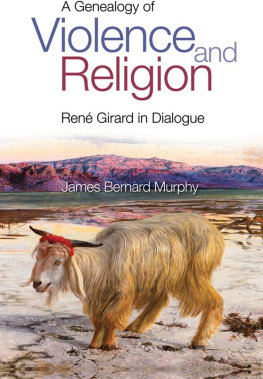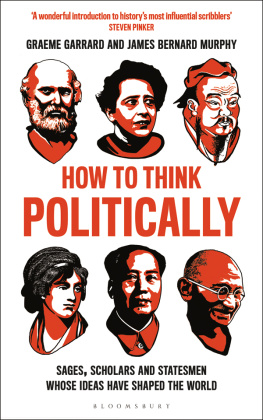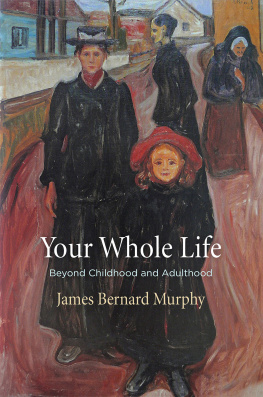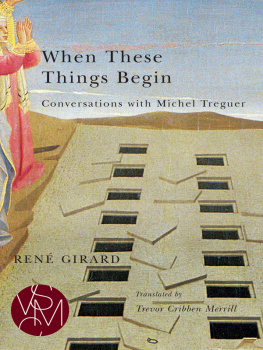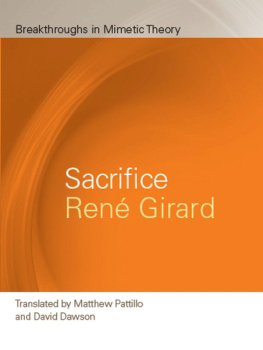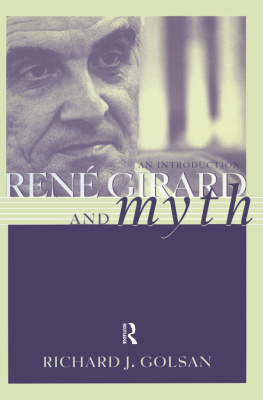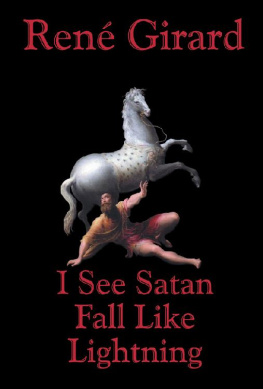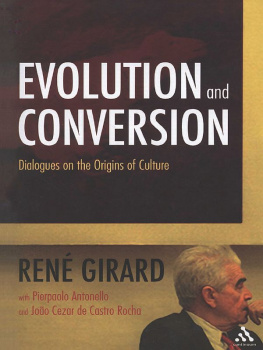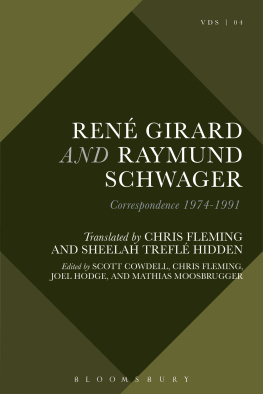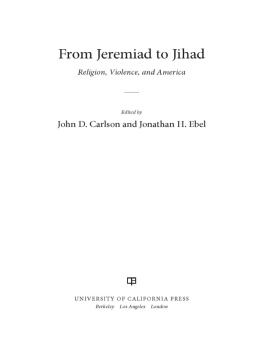A Genealogy of
Violence
and
Religion
Girards understanding of the relationship between religion and violence has never been more timely and relevant than it is now, yet his thought remains largely inaccessible to educated amateurs. Murphys book is a loving (and therefore critical) attempt to make his essential ideas intelligible to a broad audience. This is also a most unusual book. It is engaging and accessible, but intellectually and morally deep. Murphy wears his scholarship lightly, but his command of the relevant research is beyond question. It is a dialogue, and in an old Talmudic trick, it brings together great thinkers from across the centuries in fitting, convivial settings, where they speak face-to-face as existing individuals. Murphy is a polymath, and one of the books many pleasures is the way it gently teaches us about the ideas and insights of the speakers besides Girard. Not only does it raise fundamental questions, it furnishes readers with the resources to come up with their own answers. One could hardly ask for more in a short book! I think this will be a favorite entryway into Girards thought for years to come.
J ACOB H OWLAND
McFarlin Professor of Philosophy, University of Tulsa
Of the many books on Ren Girard, Jim Murphys is unique because it is cast as a series of symposia in which Girard enters into conversation with a broad range of figures from the Western canonfrom Socrates to Sigmund Freudwho have thought about desire, worship, violence, and beauty. The imagined conversations are broad and deep, contentious and full of humor. The book is fun, a rollicking good read. Though Murphy lets others do the talking, his own keen mind shows through. Neither a Girard acolyte nor someone who dismisses Girard out of hand, Murphy finds Girard and the whole range of issues he brings to light well worth a good argument. Short and accessible for students, this book would be great for use in the classroom.
D R . W ILLIAM T. C AVANAUGH
Professor, DePaul University, Director, Center for World Catholicism and Intercultural Theology
This is one of the best scholarly works I have read on Girard. Marshalling a vast backstory to Girards work, and with enviable lucidity, Murphy helps us to understand how Girards work belongs within a larger and older set of problems besides those he defines for himself. This book breaks Girards thought out of the isolation often imposed on it and adds a crucial depth dimension. It would make a great text on the undergraduate level, as an introduction not just to Girard and the issues he raises, but to lots of other thinkers as well. Their voices and their engagement with each other are laid out in a fair and critical way, in language that is clear and accessible. Anyone who takes seriously Girards ambition to reanimate the human sciences or the political implications of his thought will appreciate it.
J OHN R ANIERI
Department of Philosophy, Seton Hall University
This is a creative, well-written, interesting, and genuinely thought-provoking book. I liked it a lot, and Im impressed by the amount of material incorporated here, and the skill with which Murphy weaves conversations. A Genealogy of Violence and Religion is an excellent introduction to some of the ways in which Girards work might be criticized. Murphy picks up on some of the important questions Girard leaves unresolved, especially with regard to violence and pacifism. Based on my reading of Girard and some conversations Ive had with him, my impression is that the way Murphy has Girard responding to his interlocutors is almost always on target.
S TEPHEN G ARDNER
Department of Philosophy, University of Tulsa
In Memoriam
Joseph Francis Daschbach: 19372013
A Genealogy of
Violence
and
Religion
Ren Giard in Dialogue
James Bernard Murphy
Copyright James Bernard Murphy, 2018.
The right of James Bernard Murphy to be identified as Author of this work has been asserted in accordance with the Copyright, Designs and Patents Act 1988.
ISBN 9781845199289 (Paper)
ISBN 9781782845478 (PDF)
ISBN 9781782845454 (EPUB)
ISBN 9781782845461 (Kindle)
First published 2018, in Great Britain by
SUSSEX ACADEMIC PRESS
PO Box 139
Eastbourne BN24 9BP
Distributed in North America by
SUSSEX ACADEMIC PRESS
ISBS Publisher Services
920 NE 58th Ave #300, Portland, OR 97213, USA
All rights reserved. Except for the quotation of short passages for the purposes of criticism and review, no part of this publication may be reproduced, stored in a retrieval system, or transmitted, in any form or by any means, electronic, mechanical, photocopying, recording or otherwise, without the prior permission of the publisher.
British Library Cataloguing in Publication Data
A CIP catalogue record for this book is available from the British Library.
Library of Congress Cataloging-in-Publication Data
Names: Murphy, James Bernard, 1958 author.
Title: A genealogy of violence and religion : Ren Girard in dialogue / James Bernard Murphy.
Description: Portland, Oregon : Sussex Academic Press, 2018. | Includes bibliographical references and index.
Identifiers: LCCN 2018001612 | ISBN 9781845199289 (pbk : alk. paper)
Subjects: LCSH: ViolenceReligious aspects. | Violence. | PhilosophyPhilosophy. | Girard, Ren, 19232015.
Classification: LCC BL65.V55 M86 2018 | DDC 201/.76332dc23
LC record available at https://lccn.loc.gov/2018001612
Typeset & designed by Sussex Academic Press, Brighton & Eastbourne.
Printed by TJ International, Padstow, Cornwall.
Contents
CHAPTER ONE
Living Water: A Parable
CHAPTER TWO
Why Do We Read Literature? A Symposium
CHAPTER THREE
Mimetic Desire: A Conversation with William James
CHAPTER FOUR
A Crowd of Theories
CHAPTER FIVE
Scapegoating Sacrifice: A Discussion Moderated by John Milbank
Preface
Why Girard?
Why Dialogue?
Ren Girard (19232015) has been described as the Darwin of the human sciences for his seminal theories of violence and religion. Where does violence come from? Is there an instinct for aggression? Or does violence emerge from social rivalry? How does violence relate to religion? When people think of religion and violence, they usually think of religion as a cause of violence. In the wake of contemporary militant Islam, a literature has emerged exploring the claim that religion is an important cause of violence. After all, religious rhetoric and especially religious rituals, such as ritual sacrifice, are steeped in symbolic or actual blood and killing. And some religions, even religions based on love, are known to inspire a great deal of hatred. Certainly, history shows much violent conflict waged in the name of religion, whatever its true causes.
In the nineteenth century, some scholars, observing the same correlation between religion and violence, argued for a different causal relation. They argued that it was violence that gave rise to religion. In this view, religious language and practices are full of violence because their function is to sublimate and to control human impulses, including violent impulses. William Robertson Smith and Gilbert Murray, for example, argued in different ways that religion arose from rituals associated with hunting. These scholars thought of violence as a primordial part of the human condition, like sex and death. From a broadly anthropological perspective, religious rituals appear as ways to routinize and hence normalize dangerous impulses and fearful transitions of human life. For example, rites of initiation and of passage serve to normalize sexual impulses and the fear of crossing various thresholds in life. Similarly, rites of sacrifice and of communal meals serve to sublimate and normalize violent impulses. Sigmund Freud provided a classic and seminal account of the view that violence gave rise to religion in his Totem and Taboo . Emile Durkheim and his French students argued that sacrifice was the basis of religion and that it served to produce social harmony. That violence might in some respects give rise to religion is, of course, compatible with the possibility that in other respects religion also causes violence.

